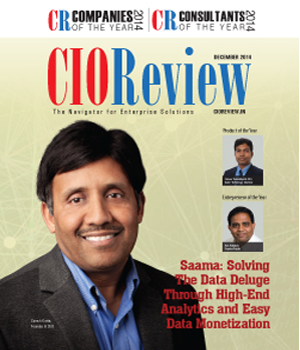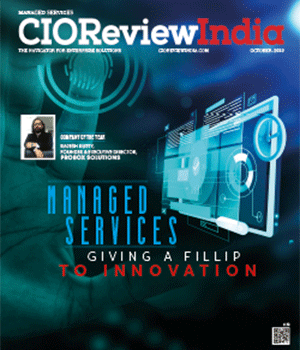
A Bridge over the Development- IT Operations Canyon
Vinod Bidarkoppa, Director (Group IT) and Chief Information Officer, Tesco HSC, Member of the Board (Tesco HSC) | Monday, 04 May 2015, 07:19 IST
 What Got You Here Won't Get You There: How Successful People Become Even More Successful’ is a best-seller by American leadership coach Marshall Goldsmith. The book takes an up-close look at the world of business, brimming with skillful and intelligent men and women. All are strong in character and personality and all aspire to be in a leadership position. But whatever has brought them success so far is not going to get them where they want to be at the pinnacle; in the future since only a handful make it to the top. In many cases, not because they are any more blessed than others but because subtle flaws in how they transact are holding back the vast majority from making it big.
What Got You Here Won't Get You There: How Successful People Become Even More Successful’ is a best-seller by American leadership coach Marshall Goldsmith. The book takes an up-close look at the world of business, brimming with skillful and intelligent men and women. All are strong in character and personality and all aspire to be in a leadership position. But whatever has brought them success so far is not going to get them where they want to be at the pinnacle; in the future since only a handful make it to the top. In many cases, not because they are any more blessed than others but because subtle flaws in how they transact are holding back the vast majority from making it big.
Marshall’s pithy observation is as true about businesses as it is about individuals. Good practices like developing and releasing successful products and apps have helped software-driven businesses become good in what they do. Importantly the reality today is that every business is a software business. If only these businesses had looked a little beyond past practices and worked on certain subtleties, many of them could have had a fair chance of going from good to great. Forbes went so far as to suggest that the traditional approach to developing strategy is now redundant, so it’s time to change.
DevOps (a happy marriage of ‘software development’ and ‘IT operations’) comes in handy here in ensuring better collaboration between a company’s operations and development teams to achieve best results. Ensuring a better transaction between software engineers, quality assurance teams and IT operations groups through DevOps produces high-quality services and products that customers want – faster than before. By doing so it aims to do away with silos and ensure deep integration between technology departments. IT leaders have realized that it is critical to adopt a practice that embraces collaboration among teams engaged in creating, developing, testing and managing products and applications so they can deliver a richer experience to the customer. Adoption of DevOps is an eye-opener at many enterprises. They realize what they have been missing all along and wonder how on earth they could have done product enhancements in the past without effective collaboration between developers and IT Operations. This approach lowers the cost of risk and experimentation while also dramatically reducing the time to take products to market.
At the crux of it all is the enabling nature of the DevOps approach. At Tesco for example, it is at the heart of technology strategy and a vital component in how we add value for customers. Scan-as-you-shop, mobile checkouts, digital kiosks, digital signage are technological conveniences and to imagine a world in retail which can run an enterprise as large, complex, as distributed and multi-channel as ours without the secret sauce - Technology enabled by DevOps, is unimaginable!
Tools and tool strategy play a vital role here. Balancing freedom for the development arms so they can be creative with the control that enterprise level architecture, governance and infrastructure demand is key to ensuring DevOps can deliver in an organisation. A CIO’s key deliverable is building a tools landscape that drives simplified agile development and removes blockers between Dev and Ops whilst keeping cost and architecture control centralized and managed. Additionally, a strategy for tooling, assessments of progress and adoption are important milestones along this journey.
In an age of innovation, disruption and multichannel commerce, DevOps assumes great prominence. Its adoption demonstrates the enterprises thought leadership - forward thinking, current and relevant. Enterprises using DevOps will be better positioned than those who don’t to compete in today’s ‘app-driven, cloud-connected, mobile-everything world. A study by CA Technologies in October last year found that 88% of 1,425 IT and business executives already have or plan to adopt DevOps in the next five years. This substantiates the claim and just goes to show the time is now, or never.
It is important for CIOs to have a superior understanding of digital business models and effectively tailor recruitment, day-to-day operations and business systems such that digitization is effectively implemented. Additionally, with Social, Mobile, Analytics and Cloud (SMAC) and Smart devices becoming almost indispensable, the role of DevOps in propelling quicker business outcomes is critical. Along with Cloud, they make it most appealing to an enterprise to consider adopting an agile model for developing business strategy.
DevOps has become essential for technology enterprises. While challenges in going completely digital do present themselves, the gains from doing so outweigh these. Enterprises are quick to act, and react to what their competitors are doing
CIO Viewpoint
With Managed Services Organizations Can Reduce...
By Krishnakumar Madhavan, Head IT & Innovation, KLA Software India Pvt Ltd
By Amandeep Singh, Vice President & Group Head - IT Infrastructure, Thomas Cook India Limited
By Brian Clarke, Solutions Architect-Networking and Collaboration, OneNeck IT Solutions
CXO Insights
Innovation in IT: Meeting Evolving Demands and...
By K Shivasankar, Vice President - Technology & Solutions, India, NTT DATA Inc
Low-Code/No-Code: The Key to Intelligent...
By Sachin Panicker, Chief AI Officer, Fulcrum Digital
Maximizing Business Insight with Big Data...















